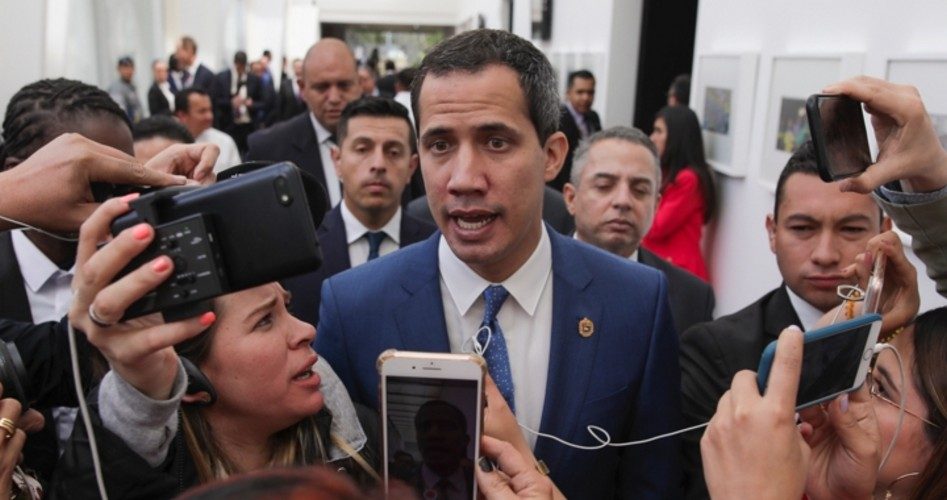
Podcast: Play in new window | Download ()
Subscribe: Android | RSS | More
Venezuelan opposition leader Juan Guaidó has traveled to neighboring Colombia, where he met with President Iván Duque and will attend a regional counter-terrorism meeting in Bogota on January 20. By traveling to Colombia, Guaidó defied a travel ban imposed by the nation’s pro-government Supreme Court. It was Guaidó’s first time outside Venezuela since last February, when he defied the travel restriction imposed on him by the Nicolás Maduro administration and attended British philanthropist Sir Richard Branson’s Venezuela Live Aid concert in Colombia, which was held to raise funds and awareness for humanitarian aid to Venezuela.
Today’s event is called the Third Western Hemisphere Counterterrorism Ministerial. Duque announced Guaidó’s arrival on Twitter, stating: “We welcome Venezuelan President Juan Guaidó to Colombia. This evening we will hold a working meeting.”
Guaidó met with Duque on the night before the conference. Before opening the conference on January 20, Duque held a bilateral meeting with Secretary of State Mike Pompeo.
On January 23, 2019, Guaidó and the National Assembly of Venezuela declared that he was acting president of Venezuela. The move immediately received formal recognition of legitimacy by almost 60 governments worldwide. It also began a year-long crisis by challenging the presidency of Nicolás Maduro, who was sworn in for a second six-year term on January 10, 2019 even though his presidency had been declared null and void by 13 of Venezuela’s neighbors.
As Maduro fights to retain control of the country with the backing of a powerful military, Venezuela’s economy has tanked — with a quarter of its 30 million people in need of aid, according to UN figures, which may underestimate the situation. More than four million Venezuelans have left the country over the past few years.
One year ago this week, President Trump recognized Guaidó as Venezuela’s leader, stating:
Today, I am officially recognizing the President of the Venezuelan National Assembly, Juan Guaidó, as the Interim President of Venezuela. In its role as the only legitimate branch of government duly elected by the Venezuelan people, the National Assembly invoked the country’s constitution to declare Nicolás Maduro illegitimate, and the office of the presidency therefore vacant.
Guaidó has served as president of Venezuela’s National Assembly since January 5, 2019. When it was time to elect another assembly president this month, government police loyal to Maduro prevented Guaidó from attending the parliamentary session in which he was standing for reelection. With Guaidó and other opposition lawmakers in absence, a rival politician, Luis Parra, was elected without a quorum with the backing of government lawmakers.
In an end-run move, Guaidó moved the session to another location where about 100 legislators reelected him. Therefore Venezuela now has not only two men claiming the presidency, but also two men claiming to be National Assembly leaders.
Pompeo congratulated Guaidó for his reelection and condemned “the failed efforts of the former Maduro regime to negate the will of the democratically elected National Assembly.”
Bloomberg reported that after leaving Colombia, Guaidó plans to attend the World Economic Forum in Davos, Switzerland, which will be held from January 21-24. He also plans to visit a visit to the Inter-Parliamentary Union in Brussels.
Photo: AP Images
Warren Mass has served The New American since its launch in 1985 in several capacities, including marketing, editing, and writing. Since retiring from the staff several years ago, he has been a regular contributor to the magazine. Warren writes from Texas and can be reached at [email protected].
Related articles:
Venezuela’s Opposition Leader Guaidó Urges Army to Back Him, Not Maduro
White House Recognizes Guaidó as Venezuela’s Interim President While Demonstrators Protest Maduro
Venezuela Legislature Wants Maduro Out; Brazil Recognizes Guaidó as President
Venezuela’s Marxist President Maduro Inaugurated for Second Term
U.S. Sends Aid to Venezuela While Cuba Keeps Maduro in Power
Venezuela’s Opposition Leader Guaidó Open to U.S. Intervention
Venezuelan General Urges Nation’s Military to Revolt Against Maduro Regime
Venezuela’s Maduro Employing Death Squads, Torture to Retain Control


